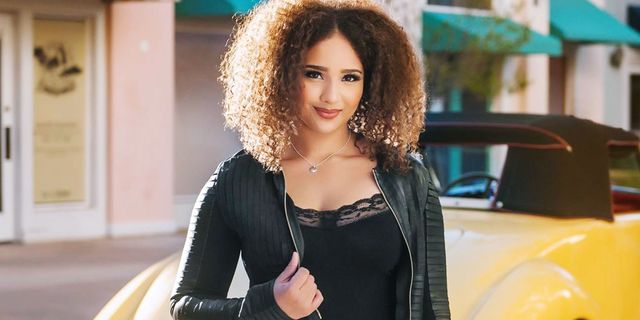Dallas news anchor Demetria Obilor reached international audiences last week when a Facebook commenter attacked her appearance. Fans quickly came to her defense on social media, and Obilor's story caught the attention of Chance The Rapper, Gabrielle Union, and more than 4,000 supportive commenters. Below, she talks to ELLE.com about double standards, assimilation, and why the fight for representation isn't over.
On television, for so long all you saw was somebody who was more slender and probably white. Now you see different body types; that catches people off guard, and there's a lot of people who responded with the racial element. You don't say anything when you see white girls wearing the same thing, but when you see me or someone like me, then it becomes an issue.
I've received nasty comments about my hair. I wear my hair naturally curly, it's always been this way, it's the way I was born. When I was working in Las Vegas, I got a nasty email from someone saying, 'I don't believe hair like that can be cleaned properly, so every time I see you on TV, I fast forward through your segment.' You're prepared to get picked apart, and working in this business, to some extent you know how to hold your tongue a little bit, which isn't always fair. It was so amazing to see so many people come to my defence and say, 'Hey Demetria, we're not going to stand for this.'
I was told in college, you'll never be on television if you wear your hair curly and natural—you'll have to straighten it or put a wig on. As bigger women, as coloured women, as ethnic women, we had to hide and disguise to become accepted. But we are just find the way we are and we will no longer stand for this sort of discrimination.
People have called me obese. Even if I was obese, why do you think you get to use that in a way that's aimed to hurt me? I come from a line of bigger women, so I know all about that. I've got big arms and I felt so self-conscious about them. But I don't want my future daughter to feel insecure if something isn't a certain way. And so many people are going through so many health issues. I have hyperthyroidism, which is traditionally supposed to make you lose weight, but it did nothing of the sort for me. I gained 20 pounds, but I love my 20 pounds, and I'm rocking with it. You never know what somebody is going through.
One of my co-workers must have been a size four when she got pregnant, she got a little bit bustier, and all of sudden she had people writing in saying, 'You look really busty. This is unprofessional. Your hips are a little bit bigger; that dress is hugging you a little too tightly.' This constant criticism comes from men and women. I think it's more hurtful when it comes from women, because I think we should stand together.
We have a long way to go. Someone said to me, 'You have to think of the men when you're on air, you don't want to distract them.' I have heard stories from newswomen who say, 'I had on short sleeves and women would write me incessantly, saying, 'You're trying to seduce my husband by showing your arms.' We don't serve men. There are so many men who reached out to me with support, so by no means is this a men versus women thing, but we have to acknowledge this patriarchal construct that has bound women for so many years. There's nothing wrong with me showing my arms.
There's so much that's 'unacceptable.' Your hair needs to be straight; if it's curly or an afro it's unprofessional. If you have curves, you need to wear a huge fit-and-flare dress to hide them, because it's too big or too sensual or too erotic. I shouldn't have to wear a potato sack to make you feel comfortable. I've heard people say, 'Well, you're in Texas now. We're more conservative.='" So you're telling me that every time I travel to a different state, I have to assimilate to its cultural norms and values in order to be accepted? That's not what America stands for. America is supposed to be a melting pot based on freedom from religious persecution and cultural persecution. Don't tell me I have to assimilate.
I have a really thick skin, so you're not going to catch me crying because you said I look a certain way in a dress or I look fat. I put myself out there to show other women: Hey, this is okay. I've been rewarded by the little girls with curly hair who come up to me, and they're so happy to see someone who looks like them. It's so important to see that representation in movies, television, magazines. It's sad that we even have to talk about it, but when you look at the history of America, you understand why we have to. Because it should've already been there—the representation.
This interview has been edited and condensed.













